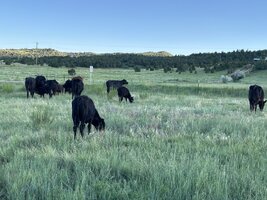Ocate Stan
Ridin' The Range
Since I joined the group last week, we have had the addition of 14 head of cattle - 6 cows, each with a baby, and 2 steer. We got them from southern New Mexico where there is a severe drought. The ranch they lived on was huge - a few hundred thousand acres 9 BLM land etc). There is adequate watering via wells etc, but feed is of course a problem. The ranch has around a thousand head of cattle. So the animals walk long distances to find food and then come back to the water. Temperatures being in the 100-114F range, results in the animals drinkig large amounts of water, laying down and bloating. They then can not get up and die. We got some of these cattle. They transported really well and when they were off-loaded they dove face first into the luscious grass we have here as can be seen in the picture. A couple of the cows are very thin - hips and ribs visible.
They have settled down nicely and are exploring the pasture. No bloating from overeating - its been 4 days so far. But we are keeping an eye out for that.
I grew up in South Africa and on my grand parents farm the cows were grass fed but given grain supplements for fattening up the skinnier ones. Are there any negative sides to giving grain to cattle that have never had it before? We have salt and protein blocks out but they seem at this point not to need it. They grass we have here is mixed - years ago the pasture was a hay and alfalfa field so theres a lot of that with some other shorter grasses. Any input or suggestions from the group will be appreciated thanks. Have a great Sunday.
They have settled down nicely and are exploring the pasture. No bloating from overeating - its been 4 days so far. But we are keeping an eye out for that.
I grew up in South Africa and on my grand parents farm the cows were grass fed but given grain supplements for fattening up the skinnier ones. Are there any negative sides to giving grain to cattle that have never had it before? We have salt and protein blocks out but they seem at this point not to need it. They grass we have here is mixed - years ago the pasture was a hay and alfalfa field so theres a lot of that with some other shorter grasses. Any input or suggestions from the group will be appreciated thanks. Have a great Sunday.



 .
.